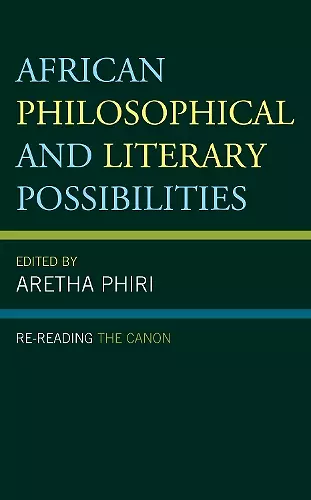African Philosophical and Literary Possibilities
Re-reading the Canon
Format:Paperback
Publisher:Lexington Books
Published:4th Mar '22
Currently unavailable, and unfortunately no date known when it will be back

Recognizing philosophy’s traditional influence on—and literature’s creative stimulus for—sociopolitical discourses, imaginations, and structures, African Philosophical and Literary Possibilities: Re-reading the Canon, edited by Aretha Phiri, probes the cross-referential, interdisciplinary relationships between African literature and African philosophy. The contributors write within the broader context of renewed interest in and concerns around epistemological decolonization and to advance African scholarly transformation . This volume argues that, in their convergent ideological and imaginative attempts to articulate an African conditionality, African philosophy and literature share overlapping concerns and aspirations. In this way, this book engages and examines the intersectional canons of these disciplines in order to determine their intra-continental epistemological transformative possibilities within broader, global societal explorations of the current moment of decolonization. Where much of the scholarship on African philosophy has focused on addressing issues associated with the postcolonial task of African self-assertion in the face of or against Euro-modernist hegemony, this innovative book project shifts the focus and broadens the scope away from merely discoursing with the global North by mapping out how philosophy and literature can be viewed as mutually enriching disciplines within and for Africa.
Born from reflection on upheavals in South African universities, from 2015 to 2017, over tuition hikes and an excessively colonial curriculum, this volume opens and closes by looking at what it means to do philosophy with and on behalf of an African conscience. Both contributed by Phiri (literary studies in English, Rhodes Univ., SA), these two pieces critique nationalisms that presume the meaning of “African” while leaving room for one, like Steve Biko’s, that resonates with diasporic black struggles. Intervening essays connect the idea of “Afropolitanism” to global crises confronting women rather than to the international experiences of African elites, and expand Ngũgĩ wa Thiongo’s reasons for promoting indigenous languages in light of digital media and online publishing. Contributors mine Nigerian, South African, and Algerian novels for their insights into intergenerational communication, authentic versus merely instrumental compromise, and the existential meaning of oppression rather than (exclusively) anticolonial content. One particularly interesting essay addresses the interplay between filmic and literary representations of alternate African futures in Nigerian science fiction. A good introduction to recent thinking about the intersecting functions of African literature and philosophy in the academy and in popular culture (including children’s literature), this collection could be a valuable resource for courses on world literature or philosophy. Summing Up: Recommended. Lower-division undergraduates through faculty.
* Choice *“The interdisciplinary engagements of African Philosophical and Literary Possibilities forge brave new discourses in the brave new worlds of expanded epistemic knowledge production and decolonized curricula. The essays in this edited volume critically re-read the African classics, bring to light fiction effaced in the shadows, and reconfigure understandings of contemporary African cosmopolitan creativity.” -- F. Fiona Moore, University of the Western Cape
“Two features unify the eight essays collected here. Each includes a rich discussion of African literature from the 20th and 21st centuries, and each is written with the knowledge that a philosopher might be reading. As an Anglophone philosopher who has long lamented the cold shoulder that my field turns to the arts, I read the essays in Aretha Phiri's collection with a great deal of gratitude. Its publication gives me hope that African philosophy will continue to enrich its reflections on the continent and its people in this way, through an engagement with narratives doing the same thing.” -- Ward E. Jones, Rhodes University
“The essays in this book make a collective argument about the historical and contemporary convergences between African literature and African philosophy. More importantly, they illustrate how the epistemic transformations brought about by interdisciplinary thinking can map activist futures. Africa-centered humanities, the authors show, are crucial resources through which we can imagine and map the labor involved in decolonizing knowledge. These inventive cross-disciplinary conversations will inspire others to rethink our ethical investments in a globally networked reality.” -- Carli Coetzee, Editor of Journal of African Cultural Studies
Each essay is testimony to the rich and often surprising intellectual journey that results when African literatures and philosophies are brought into mutual conversation. Phiri’s deftly curated and wide-ranging collection throws fresh light on contemporary questions around epistemological and conceptual decolonization in (South) Africa. Read together, these essays posit Africa, and its philosophies and literatures, as an ongoing, exciting task, rather than a static given with clear boundaries. By showing rather than telling, the book as a whole presents a generous invitation to a global audience from both disciplines to participate in African intellectuals’ attempt to "reimagine the continent and its subjects."
-- Louise du Toit, Stellebosch UniverISBN: 9781498571265
Dimensions: 218mm x 155mm x 10mm
Weight: 249g
180 pages